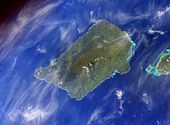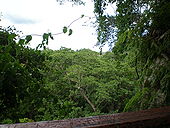Samoan tropical moist forests

The Samoan tropical moist forests are a tropical moist broadleaf forest ecoregion in the Samoan Islands. They cover an area of 3,100 km2 (1,200 sq mi).
The Central Savai'i Rainforest, comprising an area of 72,699 hectares on the island of Savai'i in the Samoan Islands, is the largest continuous patch of rainforest in Polynesia. The area contains more than 100 volcanic craters including recent lava flows. There are three broad types of rainforests, the most extensive is lowland forest, followed by montane and cloud forest.[1] The rainforest spans the inland region of the island and contains most of Samoa's endemic native species, many of which are threatened or near extinction.[2]
These include the rare and unusual tooth-billed pigeon (Didinculus strigirostris) known locally as manumea, the national bird of Samoa and other birds such as the maomao honeyeater[2] (Gymnomyza samoensis). The Samoan white-eye (Zosterops samoensis) and Samoan moorhen (Gallinula pacifica) are both endemic to Savai'i. The Samoan moorhen was last recorded in 1873 with possible sightings in 1984 at the upland forests and at Mount Silisili in 2003.[3]
In 1994, Samoa ratified the international and legally binding treaty, the Convention on Biological Diversity to develop national strategies for conservation and sustainable use of biological diversity. In 2010, protected areas in the country cover 5% of land.[4]
Approximately 30% of Samoa's biodiversity is endemic, found only in Samoa, with new species still being discovered including two new butterflies in 2009 and freshwater fish new to science. The country has more native species of ferns and butterflies than New Zealand, a country 85 times larger.[2]
Most of Samoa's land is under customary ownership, about 81%, which is governed at the local level by matai, the chiefly heads of families.[5] Conservation projects therefore take place in partnership with matai, such as the lowland rainforest preserve in Falealupo village, at the western tip of Savai'i and Tafua village on the south east coast.
Gallery
-
NASA satellite photo of Savai'i island.
-
View across the top of low-lying rainforest in Falealupo.
-
Hypolimnas bolina butterfly.
-
Forest canopy in Falealupo.
See also
- List of protected areas of Samoa
- List of birds of Samoa
- Samoan plant names, includes many plants used in traditional Samoan medicine.
- List of mammals of Samoa
References
- ^ "Samoa tropical moist forests". Terrestrial Ecoregions. World Wildlife Fund. Retrieved 3 July 2010.
- ^ a b c James Atherton, ed. (2010). "Report:Vaega Fa'atauainamole Fa'asaoi Samoa, Priority Sites for Con-servation in Samoa: Key Biodiversity Areas". Conservation International - Pacific Islands Programme, Samoa Ministry of Natural Resources and Environment, Secretariat of the Pacific Regional Environment Programme. Retrieved 3 July 2010.
- ^ "Species factsheet". Birdlife International. 2010. Retrieved 3 July 2010.
- ^ "Samoa struggling with biodiversity goals". Islands Business. 19 May 2010. Retrieved 3 July 2010.
- ^ Fana'afi Le Tagaloa, Aiono (1986). "Western Samoa: the sacred covenant". Land Rights of Pacific Women. Institute of Pacific Studies of the University of the South Pacific. p. 103. ISBN 982-02-0012-1. Retrieved 4 July 2010.
- Tropical and subtropical moist broadleaf forests
- Ecoregions of Oceania
- Oceanian ecoregions
- Environment of Samoa
- Environment of American Samoa
- Biodiversity hotspots
- Flora of Samoa
- Fauna of Samoa
- Flora of American Samoa
- Fauna of American Samoa
- Biota of Samoa
- Conservation in Samoa
- Samoan Islands
- Samoa geography stubs




